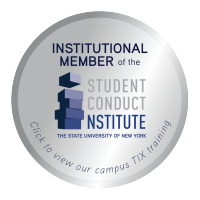TITLE IX TEAM TRAININGS
On May 19, 2020, the U.S. Department of Education issued a Final Rule under Title IX of the Education Amendments of 1972. The full text of the Final Rule and its extensive Preamble are available for review. The Final Rule requires that schools make public the materials used to train the individuals who implement its sexual harassment policies and procedures.
Below are links to the training materials for University administrators involved in the University’s Sexual Misconduct Grievance Process:
TRAININGS BY CATEGORY
Legal Framework for Understanding Conflicts of Interest and Bias
What is Severe, Persistent, and Objectively Offensive Title IX Sexual Harassment?
No Contact Orders, Emergency Removals and Interim Suspensions
Privacy, Confidentiality & Privilege in Disclosures of Sexual and Interpersonal Violence
Effective Interviewing of Parties and Witnesses
Labor Law Implications of the 2020 Title IX Regulations
Understanding the Investigative Report Template for Investigations of Title IX Sexual Harassment
Live@Distance Informal Resolutions
Collecting and Understanding Specialized Evidence
Relevance and Decorum in a Title IX Hearing
Cross-examination in a Title IX Hearing
Technology Basics – Information Security, Confidentiality, and Decorum
Higher Education Annual Clery Training and Introduction to Title IX Basics
The New Title IX Regulations: Investigations and Evidentiary Considerations
Collecting and Understanding Specialized Evidence
Effective Interviewing of Parties and Witnesses
Evidence in the Student Conduct Process
Advanced Investigations Course: Investigations of Sexual Misconduct
The New Title IX Regulations: Investigations and Evidentiary Considerations
Title IX Investigator Training
An Introduction to Managing Title IX Sexual Harassment on Campus
IMPORTANT CONTACTS
24/7 RESOURCES:
Student Health Center: 610-519-4070
Public Safety: 610-519-4444
Delaware County Victim Assistance Center: 610-566-4342
Employee Health Advocate: 866-799-2728
CONFIDENTIAL RESOURCES:
University Counseling Center: 610-519-4050
Clergy in a pastoral capacity

